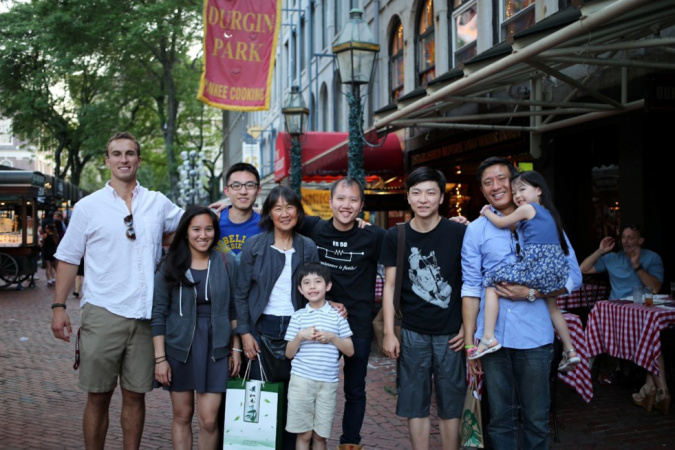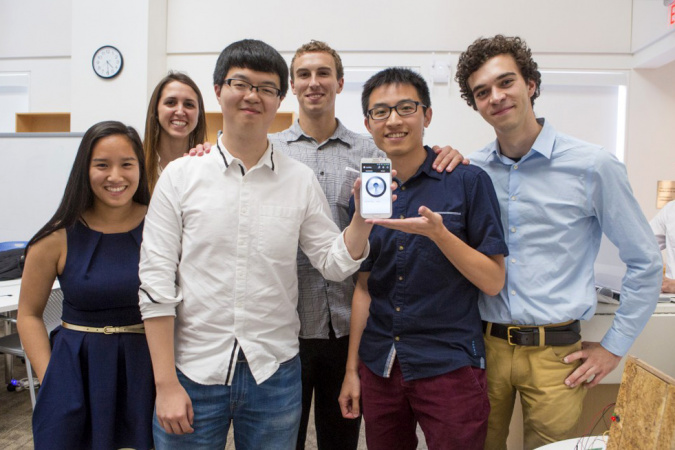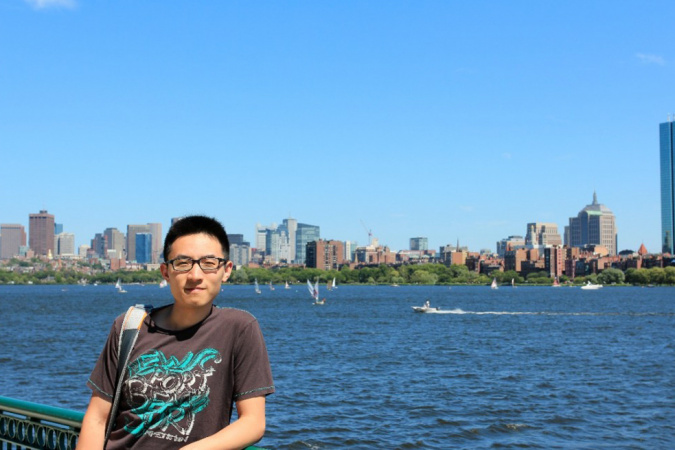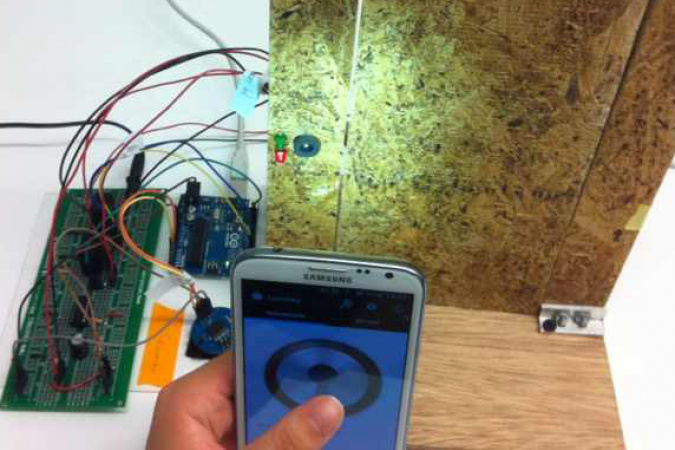Harvard-HKUST 2014 Student Sharing


CHAN Chi-Yee Micky (BEng in Computer Engineering)
I love Boston very much as the air is cleaner than in Hong Kong. Also, it is quite relaxing, because Boston has a lot of parks. We went to Quincy market to have dinner with Harvard Professors – Evelyn Hu and her husband Professor David R. Clarke and HKUST Professor – Patrick Yue and his family, and we enjoyed it very much!
In Harvard, we were mainly working on prototypes, we did a lot of testing and debugging. There were 2 projects in this program: Door lock and Mining project. I worked on the Mining project. Actually these 2 projects were not difficult, but we still put a lot of time to work on the projects. It was quite tough when working on the projects because we encountered a lot of failure. We got stuck on some technical problems quite often, at that time, we would get a coffee and start over. Also, we had a lot of conversations during discussion, I really love working as a team!
During the weekends in United States, we would always go out, we went to the Boston Haymarket to buy fruit, travelling down Newbury Street. We even went to New York, taking a 4-hour bus from Boston to New York. We went to a lot of places in New York: Brooklyn Bridge, Chinatown, Statue of Liberty, and finally we went to Top of the Rock to see the city view of New York. New York is as big as Hong Kong, it has even more people than Hong Kong, but New York has more flat land than Hong Kong. I can see that their city design is really good, people do not get lost easily because the streets are usually named by number rather name, so when we traveled in New York, we did not need to waste time to find attractions. In addition, New York also has a lot of parks, and even though it has a lot of tall buildings, you will not feel choky, that is really different compared to Hong Kong.
Cultural differences created a lot of funny stories between us. For instance, when we went to the beach, we would play some games such as dodgeball or volleyball. In contrast, some Harvard students will bring a book and start reading it to enjoy the sunshine. Moreover, some Harvard students had a regular daily life, they workout in the morning, work in the afternoon, and read at night. Compared to us, we study all the time, sometime we will watch a movie or TV series. Sometimes we would watch a movie together with Harvard students after we work, we watched “Ringu”, “Chungking Express”, and “Dude, Where is my car”. We enjoyed them very much. When we were in the United States, I always went to the Harvard Law School cafeteria to have lunch, where their cafeteria’s policy is: Grab anything you want, after that you go to the service counter to do payment. Other than the cashier, they don’t have any security system to monitor them, actually everyone can grab the food and sneak out of the dining hall. However, no one will do that! It’s not only in Harvard, there are a lot of places like this in the United States. Even McDonalds, they always have a soda machine for you to refill your drink, but actually you need to buy a cup in the restaurant so that you can use that. For the first time when I went to McDonalds, I thought it could be used by anyone, so I took out my own bottle and started refilling diet coke, but my Harvard classmate stopped me immediately. Furthermore, when some people leave a building, and they see you want to go in, they will hold the door for you, even if you are far away, as long as you are walking in the direction of the building that they left, it happens a lot, but I do not even know them, I always wonder why they are being nice to me, or everyone. Sometimes when you are walking on the street, people will give you a compliment “Nice T-shirt”, “Nice shoes”. So in the United States, it is quite easy to make friends.
After this summer research program, I really learned a lot from the other students, especially one thing – passion. In these 2 months, I saw that they are passionate about everything, and are enthusiastic towards everything, as they are also not afraid of new things. Actually our research project is much more suitable for Electronic students, but most of the Harvard students came from Mechanical Engineering, and they only had a basic knowledge of electronics. I saw that they put a lot of time on doing research, learning circuits, doing tests, and got fails a lot of the time, but they did not give up on learning and studying, and finally we had 2 amazing projects come out.
Doing great things is not talking about how smart you are, it is talking about those who won’t give up at last. A lot of people found success in their own fields in the world, like Steve Jobs, Michael Jackson. Everyone has also experienced failure in their life. Nevertheless, failure is not the end, it is just a process. People are always talking about life being like gambling, only win and lose, but I highly doubt it. I think life is just like doing a project. Even though you got a fail at last, you still learned something, and got to use it in another project. But the premise is, you have to get involved. Talent is one of the important elements, but it is not the most important thing. It needs administration, advertisement, teamwork, and people skills. If one of them is a failure, it can destroy everything. Human beings have limitations, so we need to work with other people. When people work together, the world can be better off. I believe that not only engineers build a better world, people do.
I really want to appreciate the people involved in this summer research program, I learned a lot from all of the staff, students, and professors. As I said, despite the fact that I am not a good student, I will be a good engineer! Because I believe that I am one of the parts in the world, I can use my ability to build this world, and even change the world! Although I am still young, my passion and motivation will lead me to go to the place that I can devote to the world!
ZHOU Shengke Ricky (BEng in Mechanical Engineering)
The most memorable moment was the final presentation and demonstration of the project at the end of the program. We were given a chance to present our work to professors from the School of Engineering and Applied Science. It was an exciting experience to make our work understood and recognized by professionals. Although this program was mainly about research, we also had many opportunities for some activities like hiking and travelling. For example, we were invited by Professor Evelyn Hu to a baseball match at Fenway Park between Boston Red Sox and Toronto Blue Jars. It was my first time watching a baseball game and before that, although I was familiar with basketball and soccer, I had totally no idea how popular baseball was in America.
This program was really a great experience for me. Not only did I experience what research life was at a top University in the US but I also got an understanding of the culture here. Harvard University was really of rich history and culture. There were lots of historical spots like the John Harvard Statue, Harry Elkins Widener Memorial Library, and Annenberg Hall. Also there were various museums like the natural history museum, and Harvard museum of art around the campus which were open to the public. Not only was the culture, but the natural scenery there was also quite attractive. Although they do not have a sea scene like HKUST, the Chales River flowing across the university and the sunshine in Boston were amazing. We also experienced some cultural difference when dealing with the students and staff there. Firstly we had different ways of entertainment after work. The American students enjoyed clubbing for ‘Happy Hours’ while personally I prefer to go swimming or hiking.
Firstly, we learned specific knowledge of our research field. For example, in the project I worked on hardware and communication parts. For the hardware we built our circuit starting from original schematic diagrams, to the testing circuit on bread boards, and finally on printed circuit boards. We ordered and tested many different types of components like LED, photodiodes, and amplifiers to choose the most suitable ones for our design. We also designed filtering and amplifying circuits by applying the basic electronic knowledge learned in previous courses as well as practical knowledge learnt during the project. For the communication part, since we first tried to adopt existing protocol and it turned out to be not suitable for our project requirements, we designed our own communication protocol by dividing pulse width modulation duty cycles and encoding our signals on to the pulses to be transmitted by LEDs and received by photo detectors. Simply speaking, we designed our own way of transmitting the message. After testing with the first prototype, we found the error rate was too high to accept and in order to solve that, we again checked the protocol and added asymmetric clock for sending and receiving as well as error reduction codes to achieve optimized performance.
Secondly, apart from knowledge of the subject, we also learned many useful skills throughout the project. For instance, we learned how to conduct a project from initial proposal to implementation. At the beginning of the program we were taught by Chris and Avi about how to conduct design iterations and evaluate the design, which turned out to be quite useful in our later project. By applying such techniques into our project it became easier for us to follow the schedule and plan the work. Also we learned how to communicate technical issues to people not very familiar with the topic. These were both applied to communicate between teammates during the project and present our project to the audience at the final presentation. Sometimes I found that it’s not possible to explain things down to the very details but it could be easier to demonstrate the result and make others understand what is happening, which is enough in most cases.
Finally, in terms of living skills we learned how to get familiar with a foreign environment as soon as possible and get involved into it although sometimes it’s quite difficult to accept different values from a different culture and background.
WANG Yufeng Bryan (BEng in Electronic Engineering)
In the program, we were required to design a prototype based on visible light communication technology, which is a growing transmission technology where light is used as the medium of data transfer. The technology enables us achieve secure, open and harmless transmission integrated with illumination. We had evaluated its potential applications and people’s needs, and first came up with the application in traffic systems, where cars can receive traffic information from traffic lights and other lights along the road in order to choose their route wisely. After discussion with professors and among ourselves, we found that it was a complex communication system between moving objects and it was also hard to be tested. Then we iterated the ideation process and finally had the idea of short distance security system. We found that people nowadays have trouble in using a heavy chain of keys and finding the right key for the door. And the current solutions, such as keycard, Wi-Fi key and keypad lock have the problems and concerns of security, change of key and key lost. Motivated by solving the problem, we decided to design a key system that is smartphone based, achieving security, stability and simplicity. The system we finally built consists of transmitter on the smartphone and receiver installed on the door lock. The smartphone would encrypt the key stored inside and transmit it through the flashlight by controlling its flicking frequency. On the receiver side, a photo detector would sense the pattern of flicking and pass it to a microprocessor for decode. The microprocessor would compare the key received and the key stored inside itself and trigger an open door signal if the two keys matched. With the prototype, users could successfully open door within two seconds and easily select the right key using the app we developed.
Living in Boston is also enjoyable and achieved lots of my dreams. Boston is a peaceful harbor city with several great institutions, Harvard, MIT, Boston University, etc., which I always dreamed about. Standing in front of the MIT dome and the Harvard Yard which I used to only see in pictures is really exciting. I also watched the musical Les Misérables live in theater. I had watched the movie years ago and really enjoyed the songs and story where students fight fearlessly for a new world. I realized that watching the live version is definitely worth it because it’s more inspiring and catching as if you are a part of it. The School of Engineering and Applied Science of Harvard also invited us to a baseball game of Red Sox, which is the first baseball game in my life. Red Sox, originating in Boston, is a famous team in the US Major League Baseball and achieved world championship several times. Boston people really are fans of Red Sox since they always wear hats or T-shirts with its logo on it. Not understanding the rule of baseball, my Harvard friends were nice enough to introduce us the rules as the game was going on. Out of my expectations, baseball is not as exciting as soccer or basketball, but it is still interesting. One of my favorite experiences in Boston was walking along the Charles River, the river going through the city of Boston. Around twilight time, the wind was breezing, the river glistening gently and people were either running, sitting or sailing along the river. Seeing how peaceful and lively the people’s lives were made me feel pleasant and enjoyable. Being in the eastern coast of US, I also visited New York City in the weekend. Regarded as one of the most prosperous cities in the world, it amazed me by its diversity of people, food and culture. I was shocked by the amount of elderly people talking Chinese and having delicious Dim Sum in a restaurant in Chinatown. They also had authentic Japanese Ramen even better than the ones I had in Japan and Hong Kong. I realized that New York is a real hodgepodge where people with distinct values, race, nationality, etc., are able to live together and fulfill their dreams.
I believe this fruitful summer really develops my professional knowledge and skills, broadens my exposure to multicultural environments and enhances my English communication skills. The fantastic summer experience would not have been realized without the generous contribution from HKSAR Government Scholarship Fund. It enables me to better enjoy the program in both Hong Kong and Boston. Without the award, I would have had more concerns when living and travelling. More importantly, the award also serves as recognition of my courage and initiation to reach out. It encourages me to continue reaching out and achieving excellence academically and in the future life. I believe in a Chinese saying that goes “read a lot and travel further” (讀萬卷書,行萬里路). I understand that reaching out comes with the fear of unknown, but its advantage weighs more than that. I have been to around 20 countries around the world and what I feel in common is that you will never know how big the world is and how different the cultures are until you really experience it. It helps you understand yourself and the world around. Since now people have more opportunities to travel and migrate, why not seize the change to see a bigger world?
ZHANG Tian Hugo (BEng in Computer Engineering)
There are generally 2 events in this Harvard-HKUST program, first is the design process of a product, and second is the real implementation of our design.
The main idea of the design process is to figure out the application of visible light communication. There are many potential applications for VLC technology. Some currently researched applications include implementing VLC technology in lights used in traffic, indoor GPS using “smart” bulbs, and the two applications that this poster presents: a mining industry tracking system and a door security system.
After finalizing our idea of visible light communication, we started to implement our project in Harvard pierce lab. With the support of Harvard professor and faculty, in one month, we finished our first prototype and collected information about future improvement.
Studying in the United States of America can be a wonderful learning experience. Both in and out of the classroom I can learn and practice the English language. I can also learn a lot about American life and its sometimes-confusing culture. U.S. society is made up of a diversity of ethnic groups and cultures that have helped shape American values. Some individuals and groups have a set of respected values that are quite different from those of mainstream America. People's attitudes and behavior are based on their values, such as individuality and privacy.
U.S. Americans are encouraged at an early age to be independent and to develop their own goals in life. They are encouraged to not depend too much on others including their friends, teachers and parents. They are rewarded when they try harder to reach their goals. My friends in Harvard University all cook for themselves at dinner, and they will try their best to solve problems, and only when they are too confused to solve the problem, they will ask the professor for help.
U.S. Americans like their privacy and enjoy spending time alone. Foreign visitors, like us, will find U.S. American homes and offices open, but what is inside the American mind is considered to be private. To ask the question "What is on your mind?" may be considered by some to be intrusive. In Harvard University, we lived in a Child hall, a single room apartment. Before entering our room, Harvard students will always knock the door. When they try to enter our dorm, they will also ask for permission.
Meanwhile I am often impressed at how achievement oriented Americans are and how hard they both work and play. A competitive spirit is often the motivating factor to work harder. Americans often compete with themselves as well as others. They feel good when they "beat their own record" in an academic event or other types of competition. Americans seem to always be "on the go", because sitting quietly doing nothing seems like a waste of time. Americans always try to work out their differences face-to-face and without a mediator. They are encouraged to speak up and give their opinions loudly, especially in public. Students are often invited to challenge or disagree with certain points in the lecture or in discussion.
Special thanks to Evelyn Hu, Chris Lombardo, Avinash Uttamchandani, Xuan Liang, Daniela Haas, Sarah Lefebvre, Patrick Yue, Kei May Lau, Cathy Lam, Patricia Lai for making this program possible and for advising us throughout the last two months. We truly appreciate all of the hard work and time put into this amazing program - we are so very grateful.
As I am about to continue studying on visible light communication, I will keep in close touch with Professor Hu and Processor Yue. This project can be seen as the start of my research topic, as the old saying goes; good start is one half of final success.
During this program, I also learned a lot about design process and realizing ideas, which is not only beneficial to research, but also for future career in my life. Visible light is a very high-potential technology, and will be widely used in the future. Also in this project, previous knowledge I learned in HKUST is also applied to my final project, such as Android programming skills, and filter design.


